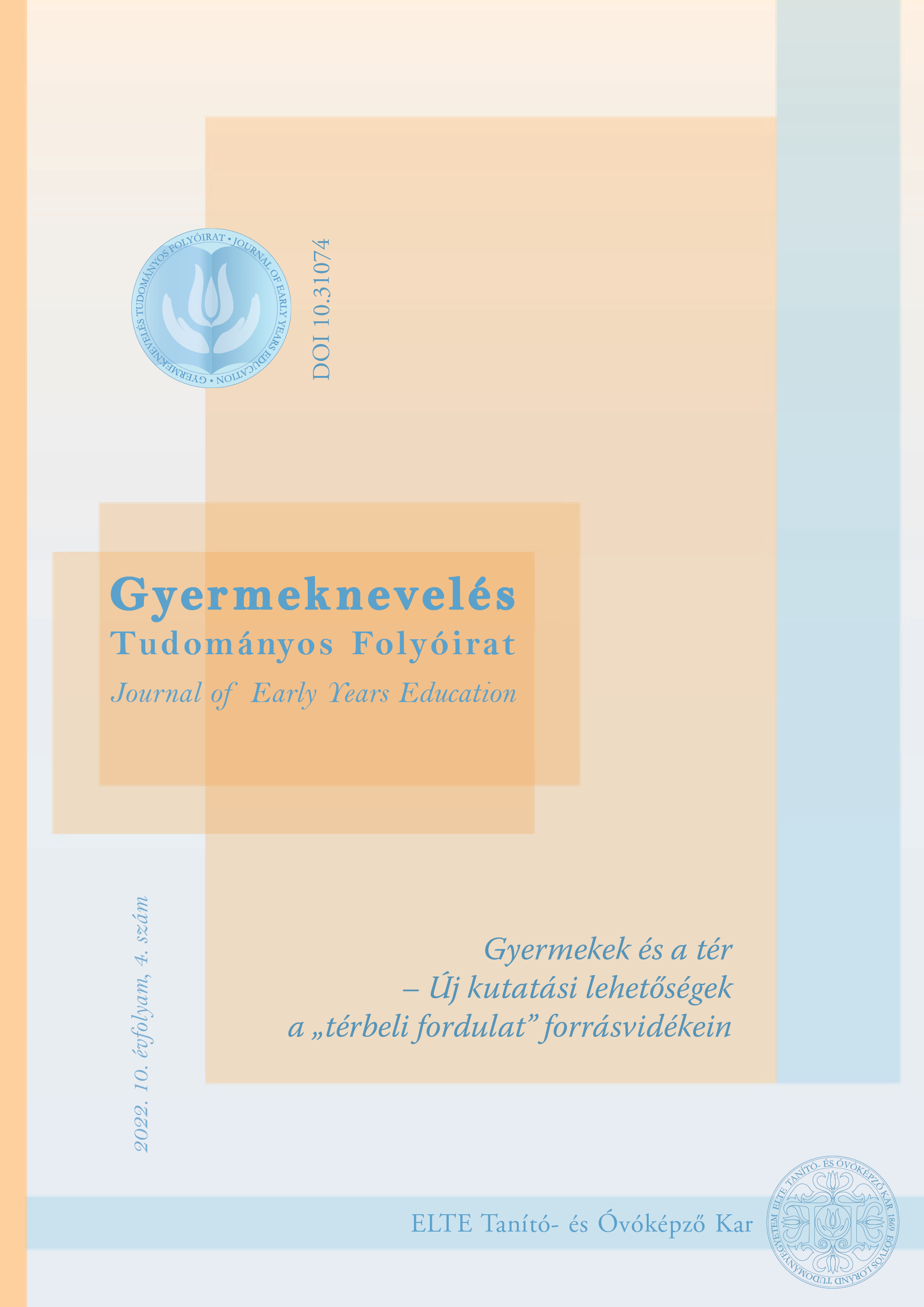Cultural Mirror – Parenting goals and values in Japan and Hungary
DOI:
https://doi.org/10.31074/gyntf.2022.4.122.143Keywords:
parenting values, parenting goals, the idea of "the good parent", cultural differences, Japanese and Hungarian parentsAbstract
The values and goals of parenting – which form the basis of parenting styles – are significantly influenced by the cultural environment. This study investigates the goals of Hungarian and Japanese parents related to parenting, and their ideas of "the good parent" ( Sample of research N=64: NJapanese=28; NHungarian=36;). The subjects were required to complete a questionnaire of 10 open-ended questions. We identified four categories (based on the responses) along which we examined similarities and differences: (1) The sense of the importance of conscious parenting; (2) The sources of parenting knowledge; (3) Relations between the parental image and the environment; (4) The goals of parenting. The results show that there are cultural differences in all these categories. However, general features also can be found, especially and in the first place, the infuence of the Western (North-American) parenting culture.
Downloads
References
Darling, N. & Steinberg, L. (1993). Parenting Style as Context: An Integrative Model. Psychological bulletin, 113(3), 487. https://doi.org/10.1037/0033-2909.113.3.487
Davies, R. J. & Osamu, I. (2002/2019). A japán észjárás. Ismerkedés a kortárs Japán kultúrával. Pallas Athéné Kiadó.
Elsayed-Ekhouly, S. M. & Buda, R. (1996). Organizational conflict: A comparative analysis of conflict styles across cultures. International Journal of Conflict Management, 1(1), 141–155. https://doi.org/10.1108/eb022776
Fülöp, M. (1998). A csoport és a közösség szerepe Japánban. Pszichológia, 18(3), 469–498.
Fülöp, M. (1999). Students’ perception of the role of competition in their representative countries: Hungary, Japan, USA. In A. Ross (Ed.), Young citizens in Europe (pp. 195–219). University of North London.
Fülöp, M. (2002). A versengés kulturális tükörben. In Czigler, I., Halász, L. & Marton, L. M. (Eds.), Az általánostól a különösig (pp. 337–356). Gondolat.
Fülöp, M. (2004). A pszichoanalízis története és alkalmazhatósága a japán és a kínai kultúrában. Thalassa, 15, 3–25.
Fülöp, M. & Gordon Győri, J. (2021). Japanese students’ perceptions of the role that shadow education plays in competition in education. Hungarian Educational Research Journal, 11(2), 143–165. https://doi.org/10.1556/063.2021.00059
Fülöp, M. & Szabó, Z. É. (2017). A kötődés kulturális különbségei. Magyar Pszichológiai Szemle, 72(1), 27–45. https://doi.org/10.1556/0016.2017.72.1.3
Géczi, J. (2010). Sajtó, kép, neveléstörténet. Iskolakultúra, Veszprém-Budapest.
Gordon Győri, J. (2009). Kulturális különbségek a tanulási motivációban Magyar Pszichológiai Szemle, 64(1), 203–228. https://doi.org/10.1556/MPSzle.64.2009.1.7
Hárs, Á. (2015). Célország vagy tranzitország? Az ázsiai országokból érkező migránsok Magyarországon. Külgazdaság, 65(11–12), 23–51. https://epa.oszk.hu/04200/04259/00124/pdf/EPA04259_kulgazdasag_2015_11-12_023-051.pdf
Hidasi, J. (2019). Gyerek, nevelés és társadalom kapcsolata Japánban. Gyermeknevelés Tudományos Folyóirat, 7(1), 7–11. https://doi.org/10.31074/gyn20191711
Holloway, S. D. & Nagase, A. (2014). Child rearing in Japan. In Parenting Across Cultures (pp. 59–76). Springer. https://doi.org/10.1007/978-94-007-7503-9_6
Indries, K. & Szummer, Cs. (2018). Freud és a felkelő nap országa – A pszichoanalízis Japánban. L’Harmattan.
Jámbori, Sz. & Kőrössy, J., (2020). Észlelt szülői nevelés a fiataloknál: társas és társadalmi hatások. Magyar Pszichológiai Szemle, 75(2), 193–215. https://doi.org/10.1556/0016.2020.00013
Kohn, M. L. (1959). Social class and parental values. American Journal of Sociology, 64(4), 337–351. https://doi.org/10.1086/222493
Kojima, H. (1986). Japanese concepts of child development from the mid-17th to mid-19th century. International Journal of Behavioral Development, 9(3), 315–329. https://doi.org/10.1177/016502548600900304
Matsuda, R. (2015). The Japanese health care system. International profiles of health care systems, 107–114. https://www.researchgate.net/publication/269404636_The_Japanese_Health_Care_System
Nguyen. L. L. A., Fülöp, M., Berkics, M., Bujdosó, B., László, P. & Thuma, O. (2006). Kultúra és pszichológia (pp. 365–385). Osiris.
Somlai, P. (1984). A „hagyományos háztartások” és a „polgári intimitás”. Szociológia: az MTA Szociológiai Bizottságának folyóirata, 85(1), 2. https://fszek.hu/uploads/zoF2Hh69d9V26mv9BxTFCjb3PBLqzt0l.pdf
Somlai, P. (2013). Család 2.0.: Együttélési formák a polgári családtól a jelenkorig. Napvilág Kiadó.
Super, C. M. & Harkness, S. (1986). The developmental niche: A conceptualization at the interface of child and culture. International Journal of Behavioral Development, 9(4), 545–569. https://doi.org/10.1177/016502548600900409
Tahhan, D. A. (2008). Two plus one still equals two: Inclusion and exclusion in the Japanese family. Japanstudien, 19(1), 151–168. https://doi.org/10.1080/09386491.2008.11826954
Trommsdorff, G. (1985). Some comparative aspects of socialization in Japan and Germany. http://nbn-resolving.de/urn:nbn:de:bsz:352-opus-66910
Van IJzendoorn, M. H., & Kroonenberg, P. M. (1988). Cross-cultural patterns of attachment: A meta-analysis of the strange situation. Child Development, 59(1), 147–156. https://doi.org/10.2307/1130396
Váriné Szilágyi, I. (1987). Az ember, a világ és az értékek világa. Gondolat Kiadó.
Downloads
Published
How to Cite
Issue
Section
License
Copyright (c) 2022 Author

This work is licensed under a Creative Commons Attribution-NonCommercial-ShareAlike 4.0 International License.

